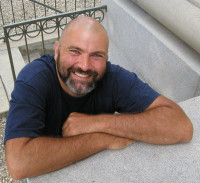The Foolish Things We Do With Our Computers
By Ben Okopnik
"Foolish Things" is a now-and-again compilation that we run based on our
readers' input; once we have several of these stories assembled in one
place, we get to share them with all of you. If you enjoy reading these
cautionary tales of woe, proud stories of triumph, and just plain weird and
fun things that happen between humans and silicon, that's great; if you
have some to share so that others may enjoy them, even better. Please send
them to  .
.
[ You can even tell us that it happened to A Friend of Yours, and we'll believe you. ]
-- Ben
Teacher, Teach Thyself
from The Perl-Trainers list
Ben Okopnik wrote: > On Wed, Dec 22, 2004 at 05:58:00PM -0800, Randal L. Schwartz wrote: > > >>>>> "Tim" == Tim Maher writes: > > > > >> On Wed, Dec 22, 2004 at 08:33:25PM -0000, Peter Scott wrote: > > >> Some advice for Perl trainers doing hands-on demonstrations: > > >> Don't type "my $self = shift" (or shift anything else) without > > >> practice. It is too easy to typo and leave the 'f' out of > > >> 'shift'. For some reason I am more prone to making this > > >> mistake in front of an audience than when coding alone. > > >> Peter Scott > > > > Tim> Been there; done that! I also recommend avoiding attempts to > > Tim> type the potentially much more embarrassing "$count" for the same > > Tim> general reason (did it once; won't ever take the chance again!). > > > > And don't do live demos on your laptop where you might have personal > > data unless you've already rehearsed every step of your demo in the > > privacy of your own cubicle, and verified that nothing of questionable > > interest might be exposed. > > > > And on a completely unrelated topic, keep in mind that the resource > > fork of a movie you downloaded to a UFS partition on MacOSX will be > > stored in a file named "._moviename.mpg", which doesn't get removed > > when you say "rm *". > > > > :-) > > Not that I've ever suffered from any of the above problems, oh no... > (Displaying your /etc/bashrc, when it happens to contain aliases > designed to discourage those who type curse words as commands - during a > demo at a bank headquarters, no less - cannot *possibly* have happened > to me. Never.)
Oh, Fuss and Botheration. I think I've Just Nuked the World...
from Richard Neill
When I was learning Linux, I decided to install the recent version of Mozilla (from mozilla.org), since the version that came with Mandrake 8.0 was a few months old, and Moz was really making leaps every month (around version 0.93, I recall).
Anyway, the installer asked me where I wanted to put it. I looked where
the distro put it, (/usr/bin/mozilla), and told the installer
to put the new copy in /usr/bin. Of course the installer
wanted to put a whole bunch of files there, not just the mozilla
executable, and it complained that the directory wasn't empty. Might it
delete the other files in the directory, it asked? Yes, I said.
Bother. It's surprising how useless a Linux distro gets when you
effectively do rm -rf /usr/bin. It's also odd that nothing
immediately breaks, e.g. KDE continued to work fine.
What I should have done was rpm -Va and then reinstalled
the packages. But in the end, I did a full reinstall.
If It Walks Like a DIG, and quacks like a DOC...
from Robin Twombly
I run several version of Linux and the worst problem I had was when I miss typed a directory name when deleting. I wanted to delete the folder var/www/ htdig and I accidentally typed var/www/htdocs thus deleting all my internet files for my apache web server.
At the time I was not clear on how to undelete a file on Linux.
Thank you for many hours of fun reading.
Happy Linux Gazette Reader
[ A pleasure, Robin. Thanks for contributing to Making Linux Just a Little More Fun! -- ben ]
Ben was born in Moscow, Russia in 1962. He became interested in electricity
at the tender age of six, promptly demonstrated it by sticking a fork into
a socket and starting a fire, and has been falling down technological
mineshafts ever since. He has been working with computers since the Elder
Days, when they had to be built by soldering parts onto printed circuit
boards and programs had to fit into 4k of memory. He would gladly pay good
money to any psychologist who can cure him of the recurrent nightmares.
His subsequent experiences include creating software in nearly a dozen
languages, network and database maintenance during the approach of a
hurricane, and writing articles for publications ranging from sailing
magazines to technological journals. After a seven-year Atlantic/Caribbean
cruise under sail and passages up and down the East coast of the US, he is
currently anchored in St. Augustine, Florida. He works as a technical
instructor for Sun Microsystems and a private Open Source consultant/Web
developer. His current set of hobbies includes flying, yoga, martial arts,
motorcycles, writing, and Roman history; his Palm Pilot is crammed full of
alarms, many of which contain exclamation points.
He has been working with Linux since 1997, and credits it with his complete
loss of interest in waging nuclear warfare on parts of the Pacific Northwest.
 Ben is the Editor-in-Chief for Linux Gazette and a member of The Answer Gang.
Ben is the Editor-in-Chief for Linux Gazette and a member of The Answer Gang.

